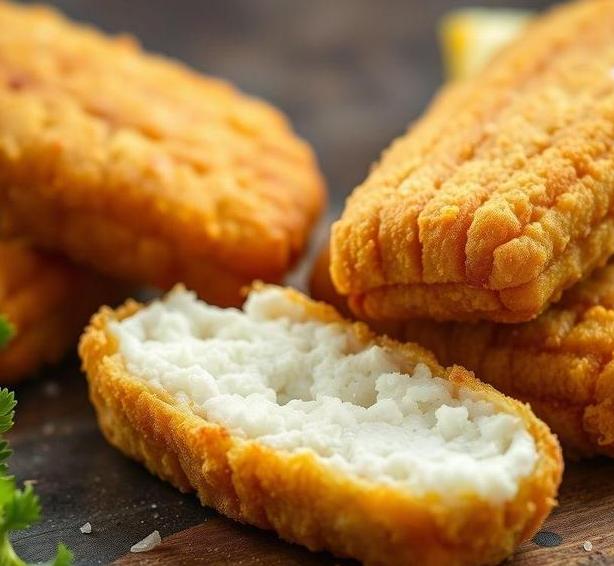Fish fingers, or fish sticks, are a beloved frozen snack or meal component for many. Crispy on the outside, tender and flaky on the inside, they’re a convenient, quick, and tasty option when you’re craving something simple to prepare. Whether you toss them in the oven, air fryer, or deep fryer, these bite-sized delights have earned their place in our kitchens.
However, like any prepared food, cooked fish fingers don’t last forever. But can they go bad after cooking? How do you ensure they stay fresh and safe for consumption? This guide dives deep into the world of cooked fish fingers, providing answers to all your storage, spoilage, and shelf-life questions. So, let’s dive in!
Can Cooked Fish Fingers Go Bad?
Yes, just like any other cooked food, cooked fish fingers can go bad. Even though they may seem like they’re safe to eat after being heated and served, improper storage or keeping them for too long can lead to spoilage. The key to maintaining their freshness lies in how you store them after cooking.
Here’s why cooked fish fingers can go bad:
- Moisture and Bacteria: Cooked fish fingers contain moisture, which can foster bacterial growth if left at room temperature for too long. Bacteria like Salmonella, Listeria, and others can thrive in these conditions.
- Texture and Taste Degradation: Over time, cooked fish fingers can lose their crispiness and become soggy. While this doesn’t necessarily mean they’re unsafe to eat, they won’t taste nearly as good as when they were freshly made.
- Fat Oxidation: Fish contains oils, and when cooked, these oils can break down and oxidize, leading to off-flavors and an unpleasant smell.
So, while cooked fish fingers don’t immediately go bad once they’ve been cooked, they are still vulnerable to spoilage if not handled and stored properly.
Shelf Life For Cooked Fish Fingers

The shelf life of cooked fish fingers depends on two main factors: how they’re stored and how quickly they’re consumed.
Here’s a general breakdown:
-
In The Refrigerator
- Duration: When stored correctly in the fridge, cooked fish fingers will stay fresh for up to 3-4 days. This is assuming they’ve been properly cooled and placed in an airtight container or securely wrapped in foil or plastic wrap.
- Storage Tips: If you’ve got leftovers, don’t leave them exposed to air. Place them in a resealable plastic bag or an airtight container to minimize moisture and bacteria exposure.
-
In The Freezer
- Duration: For longer storage, cooked fish fingers can last in the freezer for up to 1-2 months.
- Storage Tips: Wrap them in a layer of foil or plastic wrap and then place them in a freezer-safe zip-top bag to avoid freezer burn. Freezing them individually first can help maintain the shape and texture when reheated.
-
Room Temperature
- Duration: Cooked fish fingers should never be left out at room temperature for more than 2 hours. After this time, they enter the “danger zone” (between 40°F and 140°F), where bacteria can multiply rapidly. If they’ve been left out longer, they should be discarded for safety reasons.
In essence, cooked fish fingers can last up to 3-4 days in the fridge and 1-2 months in the freezer, but always aim to consume them sooner for the best quality.
Common Signs Of Spoilage
Like any food, cooked fish fingers will show visible and sensory signs of spoilage. If you’re unsure whether your leftovers are still safe to eat, pay attention to the following indicators:
-
Smell
- The most obvious sign of spoilage is an off or sour smell. Fish, in particular, has a naturally strong odor, but if it smells rancid or fishy in a bad way (like ammonia), it’s time to toss it.
-
Color
- Fish fingers should have a golden-brown exterior and a light, flaky interior. If the fish meat looks discolored, such as turning gray or developing an odd tint, it could indicate spoilage.
-
Texture
- If your fish fingers have turned soggy or mushy, particularly after being refrigerated or frozen, it may mean they’ve lost their crispiness and have started to degrade. This might not always signal that they’re unsafe, but they won’t taste the same.
-
Mold
- A more rare but clear sign of spoilage is the appearance of mold. If you notice any fuzzy or unusual growths on the fish fingers, discard them immediately.
-
Taste
- If you’ve checked for all the other signs and are still unsure, take a small bite. Off-tasting or sour flavors are an obvious signal that they’re no longer good to eat.
How To Store Cooked Fish Fingers?

Proper storage is key to extending the freshness of cooked fish fingers. Here’s how to do it right:
Refrigeration
- Cool Down Quickly: After cooking your fish fingers, don’t leave them sitting out for too long. Allow them to cool down to room temperature for about 15 minutes before putting them in the fridge.
- Airtight Containers: Place them in an airtight container or a resealable bag. This keeps moisture in check and prevents the fish fingers from absorbing other odors in the fridge.
- Avoid Overcrowding: If you’re storing a large batch, try to layer them with parchment paper to prevent them from sticking together.
Freezing
- Individually Freeze First: To maintain their shape and texture, freeze the fish fingers on a baking sheet for 1-2 hours before transferring them into freezer bags. This prevents them from sticking to each other.
- Double Wrapping: To avoid freezer burn, wrap the fish fingers tightly in plastic wrap, followed by a layer of foil or place them in a heavy-duty freezer bag.
- Label and Date: For easy tracking, label the bags with the date they were cooked or frozen. This helps you know when they’re approaching their expiration date.
Expert Tips
To make sure your cooked fish fingers stay as fresh as possible and retain their best quality, here are some additional pro tips:
- Reheat Properly: When reheating frozen or refrigerated fish fingers, use an oven, air fryer, or stovetop. Avoid using a microwave as it can make them soggy. Reheating in a high-temperature oven or air fryer will help crisp them up again.
- Avoid Refreezing: Once you’ve thawed cooked fish fingers, try to avoid refreezing them. Doing so can affect the texture and taste, leading to a less-than-pleasant eating experience.
- Portion Control: If you often have leftovers, consider only cooking the portion you need. This way, you avoid the need for extensive storage or reheat cycles.
- Smaller Batches for Better Freshness: If you’re not planning to eat a whole box of fish fingers in one go, consider cooking smaller batches at a time to preserve their freshness.
FAQs
How Long Can Cooked Fish Fingers Be Stored In The Fridge?
Cooked fish fingers can typically be stored in the fridge for up to 3-4 days. Make sure they are placed in an airtight container or tightly wrapped in foil or plastic wrap to maintain freshness.
What Are The Signs That Cooked Fish Fingers Have Gone Bad?
Signs that cooked fish fingers have gone bad include an off or sour smell, discoloration (such as turning greyish or overly dark), and an unpleasant or slimy texture.
Can Cooked Fish Fingers Be Frozen To Extend Shelf Life?
Yes, cooked fish fingers can be frozen to extend their shelf life. Wrap them in plastic wrap or foil, place them in an airtight bag or container, and store them in the freezer for up to 1-2 months.
Can You Eat Cooked Fish Fingers After They Have Been Left Out Overnight?
No, it is not recommended to eat cooked fish fingers left out overnight. Leaving cooked fish at room temperature for more than 2 hours can allow harmful bacteria to grow, making it unsafe to eat.
How Should Cooked Fish Fingers Be Reheated To Maintain Quality?
To maintain the best texture and flavor, reheat cooked fish fingers in an oven or air fryer. Heat them at 350°F (175°C) for about 10-12 minutes until they are heated through and crispy.
Can You Get Food Poisoning From Eating Bad Cooked Fish Fingers?
Yes, eating bad cooked fish fingers that have spoiled or been improperly stored can lead to food poisoning, which can cause symptoms like nausea, vomiting, diarrhea, and stomach cramps.
How Can You Tell If Frozen Cooked Fish Fingers Are Still Safe To Eat?
Frozen cooked fish fingers are typically safe to eat if they have been stored properly. However, check for any signs of freezer burn, such as discoloration or dryness. If they smell off when thawed, discard them.
Can Cooked Fish Fingers Go Bad In The Fridge If Not Properly Stored?
Yes, cooked fish fingers can go bad in the fridge if not stored in an airtight container. Exposure to air can cause them to dry out and accelerate spoilage, leading to a loss of quality and potential food safety risks.
What Is The Best Way To Store Leftover Cooked Fish Fingers?
The best way to store leftover cooked fish fingers is by placing them in an airtight container or wrapping them tightly in plastic wrap. Make sure to refrigerate them promptly, ideally within two hours of cooking.
Do Cooked Fish Fingers Go Bad Faster If They Are Breaded?
Cooked fish fingers that are breaded may spoil at a slightly faster rate than unbreaded ones because the breading can absorb moisture, making them more susceptible to bacterial growth if not stored correctly.